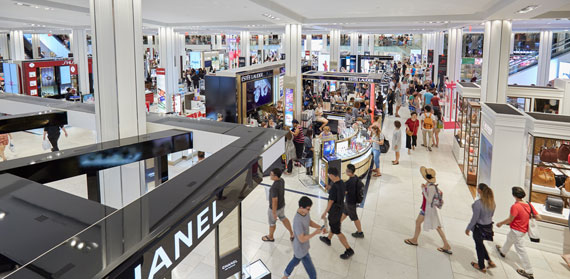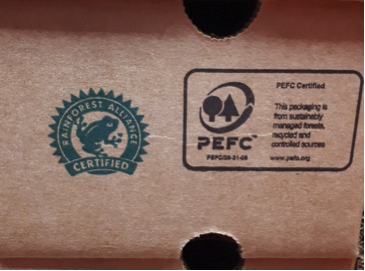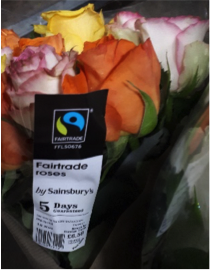andersphoto / Shutterstock.com
Guest post by Dr. Stella Despoudi, Nora Lanari and Dr. David Bek, Centre for Business in Society
During 2017 leading UK retailer Marks and Spencer launched the second phase of their sustainability strategy, Plan A 2025. This document sets out the steps that the retailer will take to procure 100% of their products from sources respecting people, communities, planet and animal welfare. By 2025 every one of their products will have Plan A attributes that address the full range of material social and environmental impacts created within supply chains (Marks and Spencer 2017).
The bold ambitions set out in Plan A 2025 are indicative of broader shifts occurring within the approaches taken by UK retailers to the monitoring of ethical and sustainability standards within their value chains. For example, there has been much controversy surrounding the decision made by Sainsbury to move away from Fairtrade certification and develop their own sustainability certification scheme for tea (Vidal 2017). Other retailers, including Tesco, are also considering taking more certification in-house. The reasons given for these shifts include: the increased cost of third-party certification and variations between the plethora of third-party certifications which generate confusion for consumers (Burrows, 2017). Creating in-house sustainability schemes for private-label products provides retailers with an opportunity to increase consumer engagement with their own brands rather than relying on third party bodies, such as Fairtrade, to provide credibility. However, this may prove to be a risky strategy as the well-publicised backlash against Sainsbury has demonstrated (Butler, 2017).
How do third-party certifications work?
Consumers have become increasingly interested in the wider quality attributes that make up a product, examples include: carbon footprints, pesticide residue levels, impacts on poverty, child labour, animal welfare and food provenance. These attributes, however, cannot be observed at the point of purchase in the supermarket (Henson and Reardon 2005). Thus, greater transparency regarding product attributes is required. A recent study by Unilever indicated that a third of consumers are choosing to buy from brands they believe are doing social or environmental good (Unilever, 2017). Millennials and Generation Z (ages 34 and under) are the most passionate supporters of sustainable and ethical products, as they want to feel the pride of ownership from products that they believe make the world a better place (Traceone, 2017).
Retailers have recognised the need to gain consumers’ trust and loyalty and have adopted third-party certifications such as Fairtrade, Rainforest Alliance, Marine Stewardship Council (MSC), and FSC Forest Stewardship Council. Such third-party certifications have become a way to communicate to consumers the conditions under which a specific commodity is produced and sourced. This can include, for instance, aspects of environmental stewardship, product safety, social responsibility, and/or ethical trade. An array of third-party labels exist to certify a range of commodities, including bananas, sugar, coffee, tea, seafood, forestry used for paper production and flowers.
Fairtrade and Rainforest Alliance are two of the best known certifications.
What does the future hold for supply chain certification?
Being certified by a third-party standard means that an independent body has verified and approved the processes of production against a set of criteria, which is often negotiated through multi-stakeholder processes. The verification of the production process against the standard is usually done through an audit of production facilities, such as farms or pack houses. There is much debate as to which stakeholders benefit the most from certifications. Critics argue that retailers benefit greatly (due to the protection that certifications afford for their reputations) whilst producers bear the brunt of the costs and worker interests are often side-lined. However, it is fair to say that certifications have played an important role in raising awareness of ethical and sustainability issues throughout the life-cycle of products from ‘field to fork’.
Why are consumer attitudes important?
The certification industry has grown rapidly in the last twenty years. Concerns about the efficacy of this system of assurance is leading to new approaches being adopted. Some UK retailers are looking to develop more integrated approaches to sustainability which will increase the ethical and environmental coverage in their whole product range, rather than in a few products. Other strategies include the move to bring certification in-house in order to consolidate brand reputation. Efforts to shift the dial on ethical and sustainable sourcing are to be applauded as the imperatives to meet the challenges of climate change and decent work are becoming more critical by the day. However, it is vital that new strategies are transparent and that best practice is shared widely to raise the bar across the board.
Key questions that arise in this new era of retailer-led certification include:
- Could these sustainability schemes be the stepping stone towards the integration of circular economy principles within supply chains?
- What role will smallholders be able to play within supply chains which increasingly focus upon smaller numbers of large producers?
- To whom are retailer-led assurance schemes accountable and credible?
- What role should consumers play in holding retailers to account? What role should retailers play in promoting more sustainable consumer behaviours?
- Retailer markets are highly competitive – how can the common good be best served through greater sharing of data and best practice models?
This blog is part of a short series by members of the Sustainable Production and Consumption Cluster in the Centre for Business in Society. These Blogs were inspired by a visit to the Munoz Group facility near Huntingdon, UK. Munoz supply flowers, grapes, citrus, ice cream and juices into a range of UK retailers. Thanks are due to the Munoz team for the insights they provided into the management of retailer supply chains for fresh produce.
Previous blog in this series:
- David Bek, Stella Despoudi and Nora Lanari 2017 ‘Less is More’ in retailer supply chains: what are the impacts on sustainability?
- Lisa Ruetgers, Jordon Lazell 2018 ‘cutting down waste on the journey from field to shelf’
Future blogs in this series (Coming early 2018):
- Nandu Devi and Stella Despoudi 2018 ‘Keeping it Lean: efficient supply chain management’
References
Burrows, D (2017) Is this the beginning of the end for Fairtrade? [online] available from
https://www.marketingweek.com/2017/07/14/fairtrade-ethical-commitments-trust/ [2 January 2018]
Butler, S (2017) Sainsbury’s AGM faces protests over plan to drop Fairtrade tea [online] available from https://www.theguardian.com/business/2017/jul/05/sainsburys-agm-rocked-by-protests-over-plan-to-drop-fairtrade-tea [3 January 2018]
Fairtrade (2017) Fairtrade Premium [online] available from www.fairtrade.org.uk [26 November 2017]
Henson, S. and Reardon T. (2005) ‘Private Agri-Food Standards: Implication for Food Policy and the Agri-Food System’. Food Policy 30 (3), 241-253.
Marks and Spencer Group Ltd (2017) ‘Plan A 2025 Commitments’.
Traceone (2017) Emerging Trends In Private Label – 2017 and Beyond [online] available from https://www.traceone.com/en/market-insight/emerging-trends-private-label-2017-beyond/ [3 January 2018]
Unilever (2017). Report shows a third of consumers prefer sustainable brands [online] available from https://www.unilever.com/news/press-releases/2017/report-shows-a-third-of-consumers-prefer-sustainable-brands.html [2 January 2018]
Vidal (2017) Move by UK supermarkets threatens to bring Fairtrade crashing down [online] available from https://www.theguardian.com/global-development/2017/jun/24/fairtrade-crashing-down-sainsburys-tesco-tea-growers-nairobi [3 January 2018]






Comments are disabled